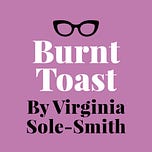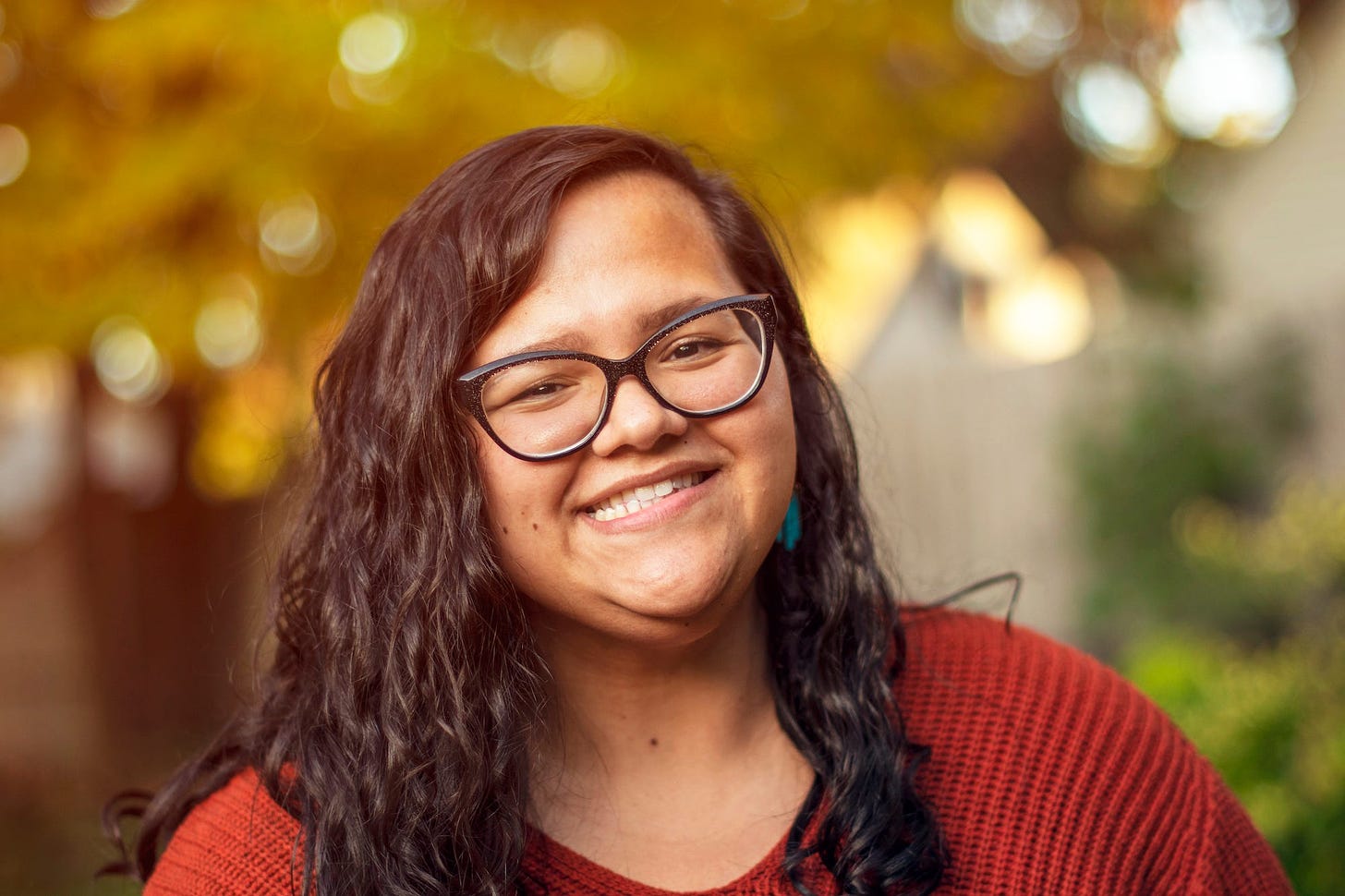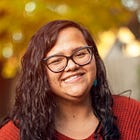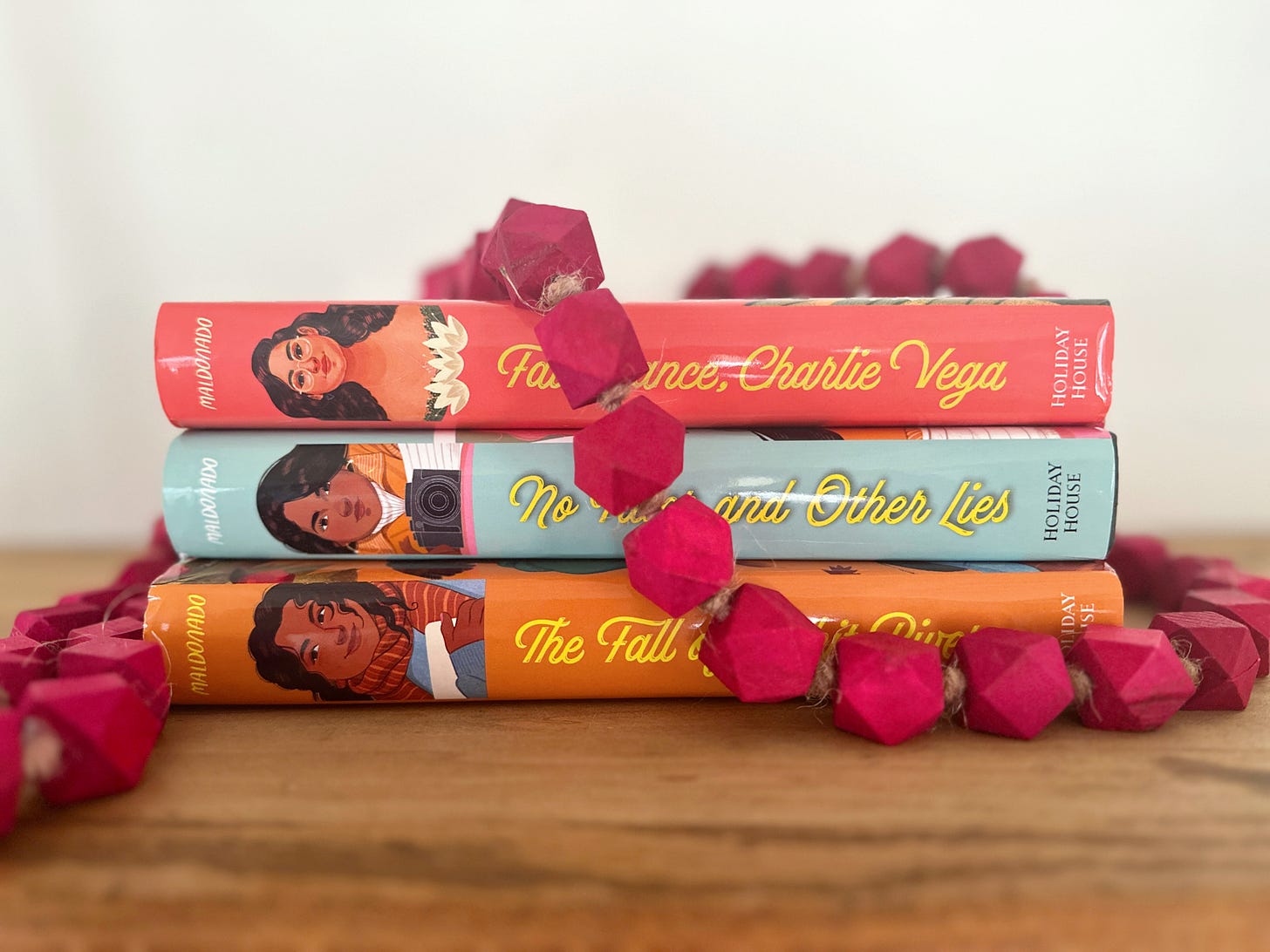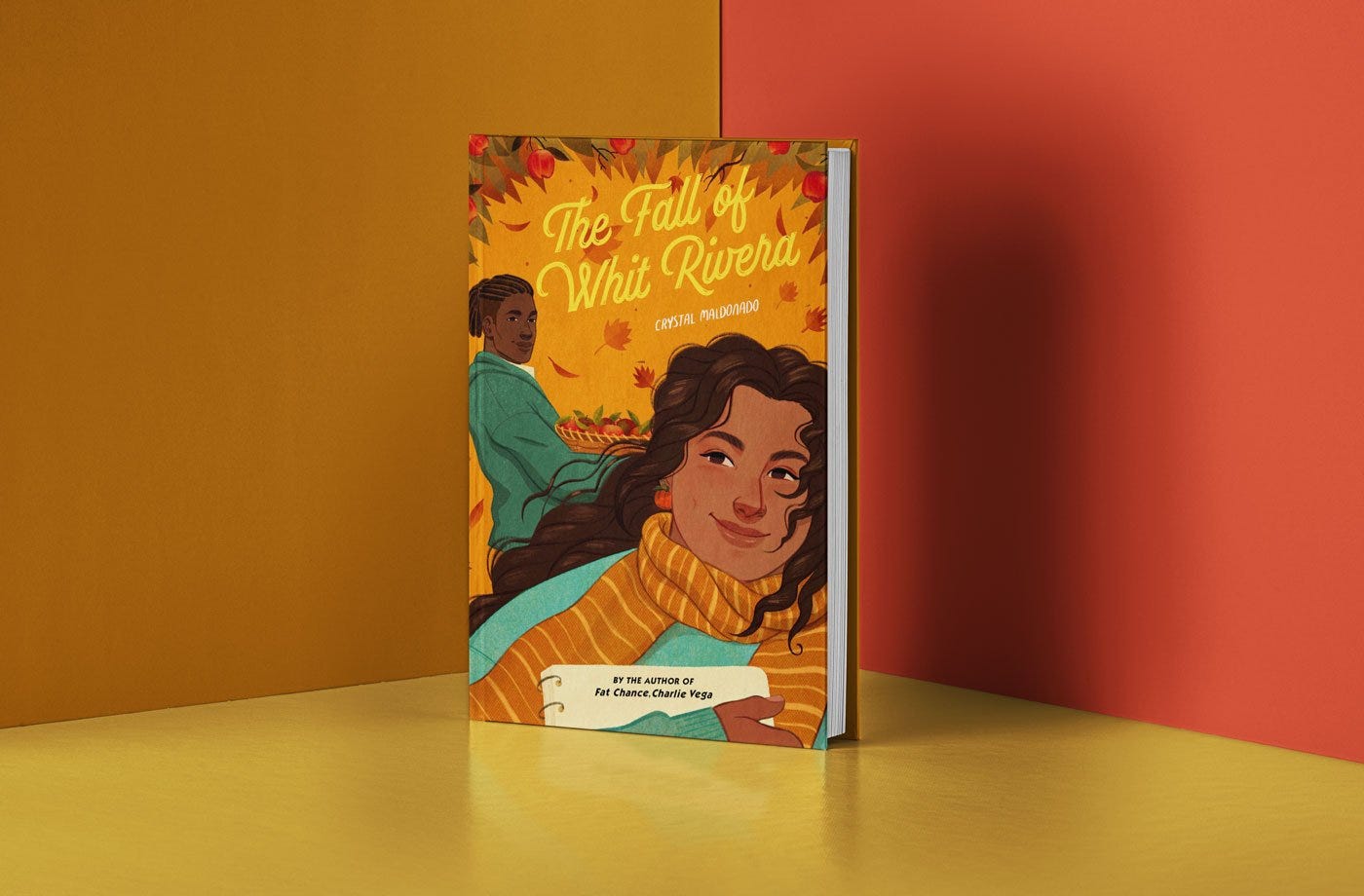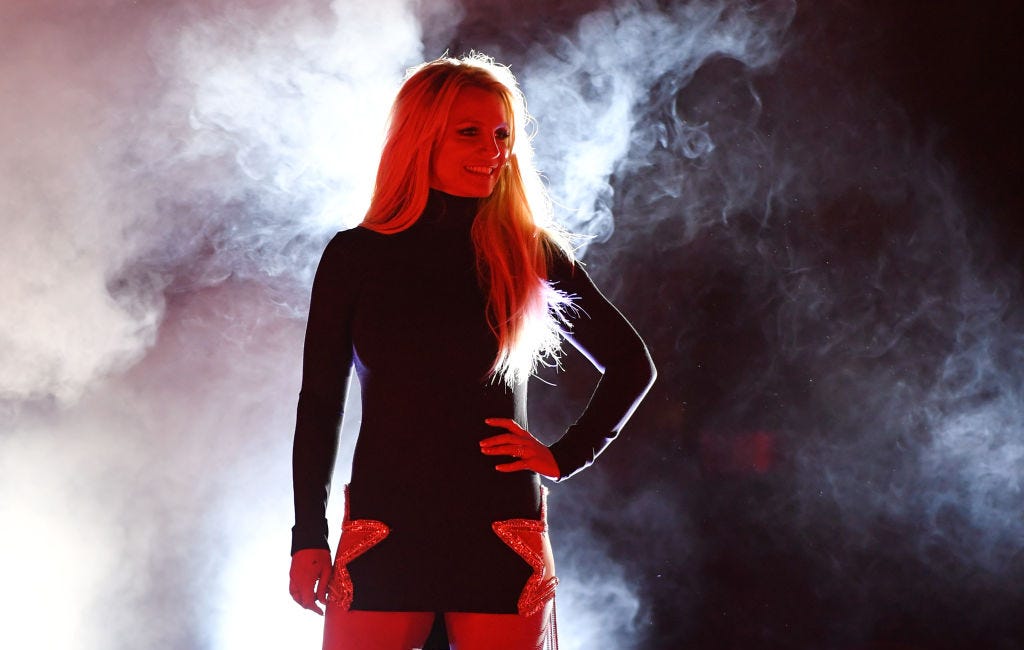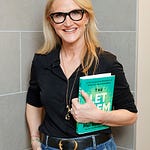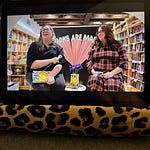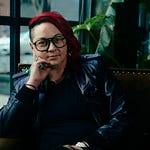You’re listening to Burnt Toast! This is the podcast about anti-fat bias, diet culture, parenting and health. I’m Virginia Sole Smith.
Today I am chatting with , a YA author who writes inclusive rom-com novels about fat brown girls.
Crystal is the author of Fat Chance, Charlie Vega, which was a New England Book Award winner and a Cricket’s Best YA fiction of 2021; No Filter and Other Lies which was named a Pop Sugar and Seventeen Best New YA. Her latest book is The Fall of Whit Rivera which we’re going to talk about today. Crystal’s books explore body politics, Latine and queer identity, relationships, complex family dynamics, and love. And they’re all available in the Burnt Toast Bookshop!
Don’t forget, you can always take 10 percent off that purchase if you also order (or have already ordered!) Fat Talk! (Just use the code FATTALK at checkout.)
Or you can take 10 percent off if you order all three of Crystal’s books, or any three books from the Burnt Toast Gift Guide with the code TREAT.
We’re going to get into Crystal’s new book, which I especially love because it features a protagonist who is navigating PCOS, which makes all sorts of things about bodies more complicated, while also just trying to be a normal teenage girl and planning her Fall Fest and having an awesome time. We’re also going to get into Britney Spears, which just doesn’t fit into anything except I needed to talk about Britney Spears to someone and Crystal is who you do that with.
Then, because Crystal is so very awesome, I asked her to stick around for an extended Butter segment. We have a bunch of amazing recs that you may want for yourself, but you will definitely find useful if you’re shopping for any teens and tweens, or young adult fans in general. You will need to be a paid subscriber to get all the good recs!
If you’re enjoying the podcast, make sure you’re following us (it’s free!) in your podcast player! We’re on Apple Podcasts, Spotify, Stitcher, and Pocket Casts! And while you’re there, please leave us a rating or review. (We like 5 stars!)
Episode 120 Transcript
Virginia
It’s so great to have you back on Burnt Toast!
Crystal
I’m so excited to be back. It must mean you liked me last time.
Virginia
So for any folks who missed your first episode, why don’t you just quickly introduce yourself?
Crystal
I am Crystal Maldonado. I’m a young adult author who writes romcoms for fat brown girls. My first my debut novel was called Fat Chance, Charlie Vega. That came out in 2021 and it followed the story of Charlie who was a 16 year old girl who had never been kissed before. Her whole story was about trying to get that first kiss, falling in love for the first time and learning to love and appreciate her body, her fat body, for what it was.
I also wrote No Filter and Other Lies which came out in 2022. This is another young adult story but it follows a 17 year old named Kat Sanchez, who was also Puerto Rican and also fat. She was drawn to catfishing and the life of just lying.
Virginia
She really goes on a journey. She gets into some stuff.
Crystal
Yeah, it’s complicated. But there are lots of dogs, so that adds the wholesome factor where her story otherwise could be a little dicey.
Then most recently, I wrote The Fall of Whit Rivera, which just came out in October. And this tells the story of Whit Rivera who is a 17-year-old fat Puerto Rican girl who is obsessed with fall. She’s just coming off of a really tough summer and has vowed to make her fall semester the best one ever. She’s hoping to plan her school’s homecoming dance, which they call the Fall Fest, but then it all kind of goes sideways when she gets paired up with her ex boyfriend to do the planning. And, oh no! He’s kind of cute.
Virginia
Yeah he’s really cute. Can confirm. Not in creepy way! Like, imagining myself as a teenager while reading the book. Now I’m making it weird. Continue.
Crystal
Exactly. So I write those books. I’m also in higher ed marketing for my day job. I’m a mom. I have a four year old. I’m a wife. I have a dog. I love glitter. I love Beyonce. I think that about covers it.
Virginia
I do want to talk a little more about Whit since she is the newest in the Crystal Cannon. As you said, she’s starting her senior year. She wants everything to be perfect. So those of us who are sort of compulsive overachievers can relate to her journey. But she’s also dealing with this new diagnosis of PCOS—polycystic ovarian syndrome. I don’t think I’ve ever seen a novel about a character with PCOS, let alone a young adult novel.
Crystal
Oh, well, thank you. I don’t want to say this is the first because I don’t know for sure. But, I hadn’t read a novel that focused on this illness ever really.
I was diagnosed with polycystic ovarian syndrome when I was 16 years old. And I just think about how much of a difference a story like this could have made in my life if I had been exposed to something like this, if I felt like it wasn’t just me that had PCOS. That was really a driving force behind the story.
Like, of course, I wanted to write another romance. Of course, there’s the autumn aspect, and all of the fun fall apple picking, and all of that. There’s a lot of fun and joy. But I also wanted this story to have something a little bit more to it. For Whit that comes in the form of this chronic illness that is technically invisible—nobody can see it by looking at her—but it definitely affects her daily life. She, as you said, just got the diagnosis. That’s what derailed a lot of her summer because she spent all of this time going to these doctor’s appointments and figuring out how to deal with the symptoms that have been seeing pop up. And does she want to tell her friends? And what does this mean for her her daily life? It gets complicated very quickly for her.
Virginia
It just feels so important. I mean, like, I’m a 42-year-old who deals with a lot of facial hair in my life. And I find it awkward to talk about and navigate. A 16-year-old dealing with that? I just want to hug her! Like, it’s just like so vulnerable. And there’s so little understanding for it. Obviously facial hair is not the most important part of PCOS, but I think, when you’re 16, it feels like one of them.
Crystal
Oh, totally. There is this scene very early on where Whit has already had this terrible phone call with her soon to be ex-boyfriend—I swear it’s not a spoiler, you know from page one, they’re not going to end up together. She’s coming off of all of these things where she hasn’t been talking to her friends and she’s trying to get ready and hype herself up for this first day of school. Then she sees she’s got this facial hair that she hadn’t noticed before and it really throws her off. It sends her into this spiral of, Oh my God, how long have I had this facial hair and how do I get rid of it? She totally panics.
I think that that’s a very real reaction to the realization that you’re not meeting society’s beauty expectations in yet another category. There are already so many ways Whit feels like she doesn’t check the boxes of beauty. She’s not thin, she’s not white, she is queer, all of these things. And now she’s adding growing facial hair. That is now a thing that I have to deal with in my day to day.
I had that same thing. Facial hair was one of my symptoms and is one of my symptoms. And there is so much shame, I will say, around facial hair. Sometimes we talk about how we have little mustache hairs or little chin hairs. But it can be so much more for people who have PCOS. Sometimes it is a beard or sometimes it’s sideburns, or it’s a lot of hair to deal with. Nobody talks about that. It feels very much like you’re on your own dealing with these symptoms, even though I think the statistic is something like one in five people who have uteruses have PCOS.1 It’s a very prevalent and “common” illness, but still one that is couched in so much shame and one that we don’t talk about very often.
Virginia
I just want to say, too: A lot of folks claim their facial hair and are really into their facial hair. That’s amazing. We’re here for facial hair. I absolutely don’t want anyone to feel weird about that, or othered. But it’s part of this whole thing Whit is going through of feeling out of control in her body. And again, when you’re 16 and everything is rough, it’s a lot.
Crystal
I also want to reiterate, Go team facial hair. You do you!
For Whit, it ends up being just yet another way that her body feels like it’s not hers. She finds it difficult to deal with on top of all of these other symptoms and all these other ways that her body feels like it’s not listening to her. So I thought that is a kind of an in your face way to talk about one of the more common symptoms of PCOS.
Especially because this illness is something that really varies for each person. In the book, there’s this long list that Whit has where she talks about all of these different ways that PCOS can manifest in your body. She’s very clear, like, oh, but it’s different for every single person. So you actually have no idea which of these symptoms are going to show up. And that’s part of the exhaustion, too. Because as doctors do, they often are like, “just lose weight and it’ll fix itself.” And of course with PCOS, it’s extremely difficult to lose weight.
Virginia
It’s such a frustrating diagnosis and such a frustrating treatment to be given for this diagnosis.
I live with endometriosis, which also no one really understands. With all of these menstrual conditions, there is just so much stigma and there’s such a lack of knowledge and sensitivity and nuance in how they get talked about. I think it’s just great to have a novel dealing with that right at the edge when a lot of kids are getting these diagnoses and trying to navigate them.
Crystal
That’s really meaningful for me to hear. My diagnosis was 100 percent self diagnosis. I had been going to doctors sporadically because I was a fat kid. Very early on, I did not want to go to the doctor. That became a pain point for me. I did not regularly want to see medical professionals and everyone in my family was also fat, so they were also anti-doctor. So we weren’t really seeing doctors regularly, but I knew something was going on with my body around the time I was 14, 15, 16. Usually people notice it when their periods are all over the place and are not predictable. That was what was happening with me so that was a very clear one.
I ended up just reading one of those magazines like Cosmo Girl or YM, and it was in the health section, there was this teeny tiny paragraph about this little known illness that some women can experience. That was how I found out about it. I clipped that out and I was like, “I have to go to the doctor and talk to them about this illness, this PCOS thing.” I had to do a bunch of tests, and it turned out to be correct. But I just think God, if this book can help even one person do that self diagnosis or even just feel less alone in their diagnosis, then that will be all I can ask for.
Virginia
It gives them something to ask their doctors about to advocate for themselves. I love that you found it in a teen magazine. You know I started my career in teen magazines. I’m like, Okay, we did a few good things.
Crystal
You did. You certainly did. Especially for the families that didn’t talk at all. I had teen magazines and that was about it.
Virginia
There were a lot of great editors at those magazines who were thinking about how do we get more body literacy in here in between all of the CoverGirl ads and bikini body stories.
Crystal
Readers like me appreciated that.
Virginia
Talk a little more about how you see the PCOS stigma continuing to show up?
Crystal
There is more familiarity with it now, which I’m very grateful for. At the same time, the narrative still very much feels the same when it comes to PCOS. I don’t want to say that every person out there is still saying just lose weight and it’ll fix itself. But overwhelmingly, that is the advice.
I am a fat activist and I am anti-diet culture. So trying to examine having this illness, while also trying not to set myself back in terms of all of this work that I’ve done to push back on dieting and to try and appreciate my body as it is—those two things often feel like they don’t go well together at all. It’s like oil and water. It’s difficult, I think, to find specialists who understand that and who are talking about it in that meaningful, kind of nuanced way.
Let’s be honest, a lot of medical advice out there now is from influencers and that’s always dicey. How do you navigate finding someone who understands what your illness is, gives you correct and healthy and safe advice, and isn’t trying to do harm or trying to monetize your illness. That’s a really difficult landscape that we’re in right now. People who have been harmed by the medical industry, who have been harmed by doctors, who have dealt with these biases are seeking out alternative forms of support, of medicine in general. We’re just trying to find some some people out there who understand us.
I think that’s especially true of typically issues that people who identify as women end up having, like endometriosis and PCOS. We tend to have to find these pockets of the Internet where we feel like we’re being talked about and heard in a respectful way. But that also brings up these other issues. So it’s like yes, we’ve made some progress. We’re talking about these things now. But also, have we really?
Virginia
I think these menstruation related conditions are really vulnerable to diet culture and wellness culture marketing because you’re struggling with them, aren’t getting good information from doctors, often they’re being dismissed. It can take years to get a diagnosis.
So then, you, you know, because you’re still suffering and struggling, you turn to other sources for information. These diets that are geared all around supporting your menstrual cycle, the seed cycling of it all, all of that stuff. Some of that may be really beneficial to folks, but nobody’s really vetting it yet. People deserve to be heard. And yet the people now, the brands and the influencers, are stepping up and saying, we hear you. We see you. Like, they aren’t necessarily doing anything all that different from what the mainstream doctors are. It’s still kind of one size fits all advice about diet and exercise and that kind of thing.
Crystal
And I think it’s really frustrating and also scary when we think about teenagers or really anybody at any age, looking this information up and just being so desperate to find that sense of community. But who is looking at this information and who’s vetting it and who’s making sure that we’re not causing more harm? I don’t have good answers for that. So I thought, well, at least I can write a book and talk about this and hopefully raise some awareness around this. I wanted Whit to be the kind of person who exists both as someone who has this illness, but who is also anti-diet culture and who appreciates her body.
Virginia
I thought you threaded that needle incredibly well.
I was really interested in how you wrote about weight in this book. In Fat Chance, Charlie Vega, that very much is Charlie’s story of coming to terms with her body, finding fat politics, finding fat community. Whit’s relationship with her weight, even with the PCOS stuff, is a little more in the background in a in an interesting way. I love that as she embarks on the relationship that is the big relationship in the book, she never really questions whether he’s going to find her attractive.
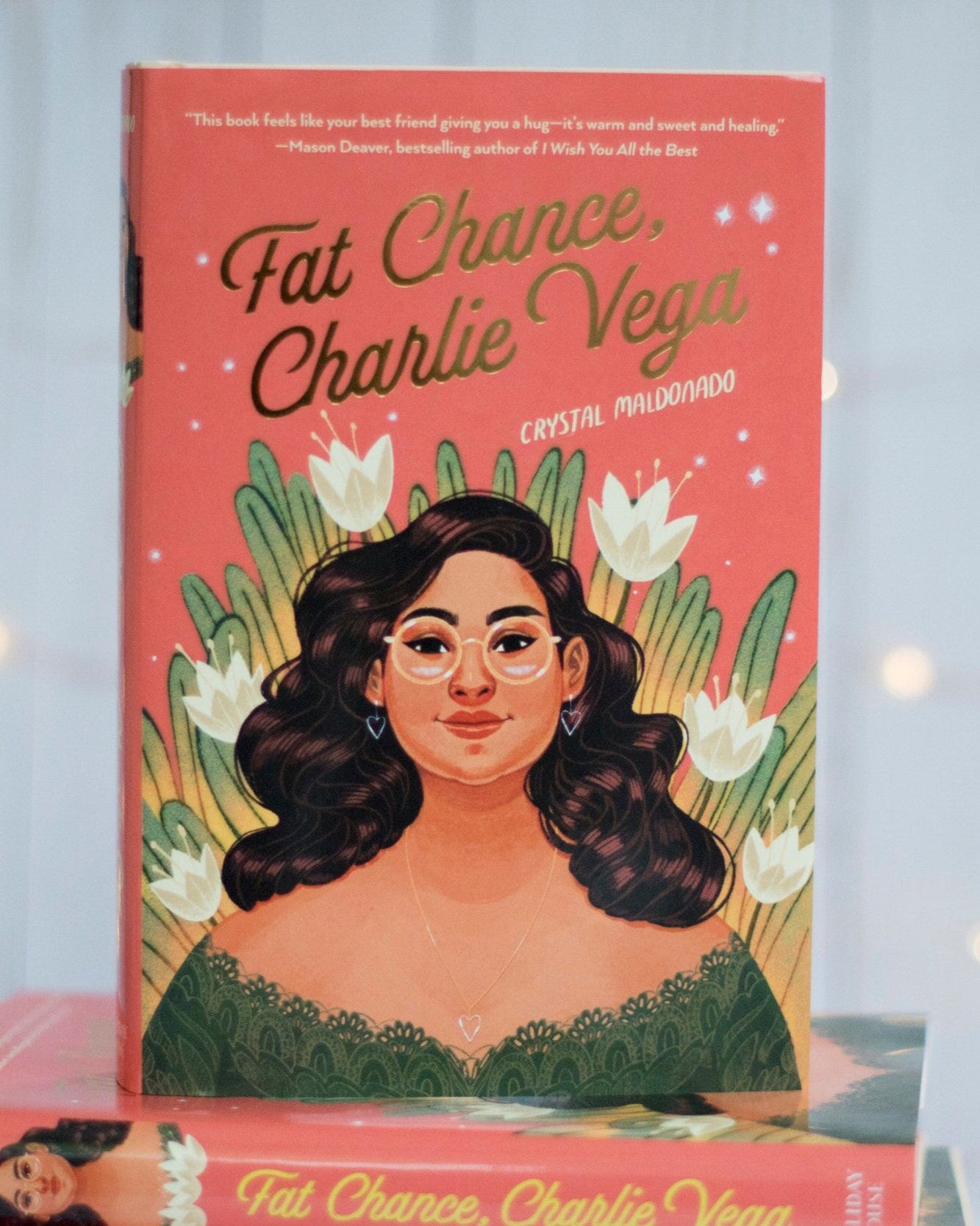
Crystal
I went back and forth a lot on how just how much of a role did I want her weight to play in this. Just because weight gain is such a part of PCOS and I wasn’t sure did I want her to be totally fine with it or did I want her to be grappling with it? I ultimately settled on Whit being kind of a matter of fact about her weight. When we meet her at the beginning, she talks about how she has lost weight previously so she knows what it’s like to be on the smaller fat side. And now she also knows what it’s like to be on this other side of things. I thought it was a nice way to be able to talk about some of that small fat privilege that we sometimes forget exists. I’m someone who my weight has been all over the place, So I felt like I could speak to this from personal experience. I wanted to talk about how no matter where you are on the spectrum, it doesn’t devalue your existence. And how sometimes when we lose weight, we think we’ve beaten the demons like, oh, well, I’m cured. I am so much better now and I don’t think about fatness and all of this stuff. But really, it’s just we’re thinner and society’s nicer to us.
Virginia
You articulated that so well, that she was like. “I thought I was really all the way there on fat positivity.” Turns out, it was just easier to be a size 14. And I was like, oh, damn.
Crystal
I think that a lot of us deal with that. And honestly, I don’t blame any of us for feeling that way. Because it is this huge shift in the world around you, how they see you, how they talk about you, how they think about you, how they think about your body.
So I wanted to get to the heart of that through this character who’s just 16. She’s observant but also kind of self obsessed, right? She would be able to see like, “Oh, my teachers are making comments about my body in ways that they really should not be doing.” When you’re fat that happens all the time. It’s just changes the types of comments that you get. You might get a question from a teacher after you’re a small fat like, “Ph, well, how did you lose the weight?” Versus, oh gosh, you look different. That’s a coded way of saying, like, you got fatter. So I wanted to explore all of that, which I think I didn’t get to do as much in Charlie Vega. It was nice to talk about this in a more nuanced way, where even when you’re fat, there are still levels of fatphobia and internalized fatphobia that you deal with and how that can be really tough sometimes,
Virginia
I love Charlie, I’m Team Charlie forever. But I was just fascinated to see you really evolving this conversation and play with how you talk about weight through these characters.
Crystal
Wherever you are in your journey, you’ll hopefully find a character that lines up with how you’re feeling, right? So if you’re newer to fat activism, then I think Charlie’s story is going to be the thing that really gets to the heart and soul of what you’re going through. But if you’ve kind of been at this for a bit, and you’re tired, then Whit might be a character that you’re like, yeah, it is exhausting. I know I’m really attractive, but it doesn’t make it any less difficult to deal with everyone else.
Virginia
Okay, I have no good segue for this, but we need to talk about Britney Spears. We just need to.
Crystal
Let’s do it. I am so excited. But also so sad because there’s almost no fun part of talking about the Britney memoir and just all that has happened to her. It’s just I want to scream from rage I think because of how sad and tragic I find her story.
You read the memoir?
Virginia
I listened to it, I listened to Michelle Williams. (Note: That’s an affiliate link to Libro.fm, the audiobook platform that supports indie bookstores!)
Crystal
I listened to it, too. Michelle was phenomenal.
And just as an aside, the TikTokers who made the audio version of Michelle Williams impression of Justin Timberlake saying fo shiz, fo shiz? Shout out to them.
Virginia
Doing the Lord’s work.
Crystal
I could picture it, with his little cornrows from back in the day.
Virginia
Oh God. It’s just mortifying that he exists and walks around in the world.
Crystal
I know. I am right there with you.
Virginia
But before we talk too much about them, tell us: What’s your relationship with Britney?
Crystal
Yes. I thought you’d never ask.
I am a long-time lover of Britney Spears. I honestly have this weird memory of being in Florida back when “Baby One More Time” just hit the radio. I was at a flea market with my whole family. I was walking around a tree because I was bored and done with the day of shopping, and this song came on and I’m like, “This is the greatest song I’ve ever heard. Who is this?” And of course at the time, there was no way to look up anything. I’m just like, “Well, I hope I can find out someday who sang that cool song.”
Virginia
How old are you for this?
Crystal
I would have been probably around like 10 or 11.
Virginia
So, a little bit younger than her.
Crystal
Yeah. I was just infatuated. And then because in the late 90s, early 2000s women were told that they had to hate other women, I did go through that phase of “Oh never mind I don’t love Britney Spears,” even though I’m buying all of her albums, and following her online and all of her photos and I care deeply about what she does, but I don’t like her. That would be that would be silly. So, you know, I was secretly a huge fan.
Virginia
This is me with the Spice Girls, by the way.
Crystal
What an exhausting time, right?
Virginia
What an exhausting time. Absolutely.
Crystal
So that was where I started with her. I know in high school, I just loved her. I was that person who just was obsessed. I had Britney posters in my room. I was like, “Oh, I have a crush on her, but it’s just a girl crush,” which is what we used to call crushes on girls back in the day. And then it turns out, oh, I’m bi and I just love her. I loved her to the point of making—there was this thing called Live Journal back in the day where we would journal. So I would spend hours making icons and layouts of Britney Spears.
Virginia
I’m so happy I know this now.
Crystal
Yeah and for those who don’t know, icons are what we now call avatars. But back in the day, it was like you didn’t use yourself, you used a celebrity that you really enjoyed. That was Britney for me. I just adored her. I remember watching her all over MTV. Making videos and behind the scenes, things like that.
Do you remember the Diary series on MTV? It would be like the diary of so-and-so? She had one, it was like The MTV Diary of Britney Spears, and she talked about diet culture. I remember learning the word “moderation” fro Britney. Because back then it was always like “how do you keep yourself so skinny?” And she had this monologue where she was like, “Oh, well, I still eat McDonald’s french fries. I just do everything in moderation.” And that’s how I learned the word moderation was because I was like, “Okay, I just have to be like Britney and do everything in moderation.”
Virginia
And, by the way, “moderation” means I’m dancing 900 hours a day and my dad doesn’t let me eat but okay. Also genetics, she has skinny white girl genes.
Crystal
She totally does. And I mean, good for her.
So I followed her career very extensively, loved her so much. And then there was this huge backlash. I’m sure you recall how sad I think it was and how scary to watch this happening with her. She got married a couple of times. Then she got pregnant with Kevin Federline’s baby and the world was watching and was like, what’s going on with the princess of pop and it was just like watching this really sad downfall in real time, where she’s hounded by the paparazzi, but society is weirdly fine with it.
Virginia
Totally fine with it. And making fun of her body at this point. Like, she obviously gained weight while growing children and yet has never been fat, but softens a bit and people are like, Oh my God, Britney!” and we saw all those tabloid photos of her with a Frappucino or whatever.
Crystal
She got so much hatred and the misogyny that was thrown at her was so toxic. I just remember being really influenced by what was being said about her, and thinking, “If she is fat looking like that, what does that say about me?” And how I must be the worst person ever because I enjoy a Frappuccino from time to time. And I remember taking that commentary around her very personally.
Virginia
She was a cautionary tale of bodies, but also mental health and maternal fitness. She was being ripped apart for being a human and being a human under what we now know were pretty appalling circumstances. I mean, I definitely judged her. I was like, “Well, she just seems like a train wreck and what an irresponsible mother.” I totally bought into all of that.
Then listening to the memoir, I’m thinking “Oh, you were a terrified young mother, you had no real emotional support. Literally no one has ever cared about your emotions, Britney.”
Crystal
No. It was impossible to not be swept up in this storm of just judgment and hatred that was sort of being thrown her way. I wasn’t sticking up for her. And that was just kind of how the media treated women. I remember a similar thing happening with Mariah Carey and her mental breakdown. And then reading her memoir and also thinking what a terrible time it was to be a woman and to be anything less than perfect in the spotlight. I just was thinking about just how symbolic I think a lot of what Britney went through was. It showed how society thought of women and how we thought of ourselves and how we managed to come out on the other side.
You can understand people getting into these MLMs that shill these weight loss drugs, right? Because it’s like, I get it, these people have been told their entire lives that their whole worth was tied up in their body and their looks. There are two ways you can go, you can become a an anti-capitalist anti-diet culture. Like, a let’s burn everything to the ground person. Or you can become someone who’s like I have to chase perfection for my whole life. Otherwise, I have no value.
Virginia
It is dark. It is really.
Crystal
I had so many questions during that memoir. Tell me your your experience and thoughts?
Virginia
So I’m her age. I think I’m a year older than her. So I never had the Britney worship that you had because I think I was like, I’m trying to be Angela Chase from My So Called Life. Like, I’m, like, totally intense. And who is the fluffy cheerleader pop star? I was like that.
Crystal
I got it.
Virginia
And yet, obviously, she was still on my radar. I knew all her songs. I wasn’t actually ignoring her as much as I thought it was. It made me realize how much these constructions of femininity through these 90s pop stars—Jessica Simpson is another one—were really a way of marketing purity culture. Like, she’s living with Justin and yet they are still telling America she’s a virgin.
Crystal
OK so on purity rings. I bought one for myself! My friend bought herself one and was like, “will you buy one and we can just wear these purity rings together?”
I know. It was a bad time. Sorry. Please continue.
Virginia
I get it. I was not actively a part of purity culture, but I still deeply internalize these good girl/bad girl ideas about sex and what you’re supposed to do all of that. That was really interesting to realize how much we were all being fed the super toxic narrative.
I do think there’s something kind of complicated about the fact that we’re now spending a lot of time feeling bad about this white, very successful, marketably beautiful pop star.
Lots of people are growing up in abusive households and being exploited by their parents and we’re not buying their memoirs and their memoirs aren’t narrated by Michelle Williams.
Crystal
Yes, it’s true.
Virginia
And conservatorships actually have much more negative impacts on disabled folks and otherwise marginalized people. So I do sometimes get uncomfortable with how much time do we need to spend interrogating what we did to white women in the 90s. But, I don’t know. I think for all of us who lived through the 90s there is some trauma back there. It was a lot to sit through.
Crystal
She is successful. And she’s white. And she’s thin, and she’s beautiful, and all of those things. How much do we need to spend the time on it? But then I also think part of it is justice for the rest of us who weren’t those things and still had to deal with a version of that.
Of course, not all of us were put in conservatorships. But I mean, I didn’t grow up in a very supportive household. There was nothing pushing back against these narratives. It almost reinforced the idea that if you aren’t behaving well, this is what’s going to happen to you. I think for a lot of us now, being able to look back on that and be like, wow, she really went through it is almost giving ourselves permission to admit that we really went through it. It was a really difficult time to just exist. We didn’t ask for any of that.
It’s almost hard to put into words how big of a celebrity Britney Spears was at the time. But she was everywhere. You could not escape it. Like, you couldn’t go to the grocery store without seeing a magazine calling Britney fat or saying that she was a slut or whatever terrible term.
For me, I’m like, okay, I wasn’t, it wasn’t all in my head, right? Like, it really was a difficult time to exist. There is a reason that I felt so bad about myself. It wasn’t just me.
There were also parts of the memoir that I did find kind of empowering, too. There was a section where she talks about how she when she was stuck in the conservatorship and had to do the Las Vegas residency she would not do hair flipping. And it was I was like, wait, that’s actually so badass.
Virginia
Yes, I wrote about that for the newsletter. I loved that. They basically owned her at that point, like she had to do the show. She had to wear the outfits. She was being starved on these diets. And she’s like, but I will not flip my hair. That is my line.
Crystal
Hats off to you, Britney. Good for you. There is beauty in finding the power that you can take back and making the most of that.
Virginia
That was probably one of my favorite parts.
It was also interesting, as a writer, to compare the book to what we see on her Instagram today. Like you can see the presence of the ghost writers, for sure. The voice in the book is often very childlike, but she has this very clear lens on everything in the book. When you follow her on Instagram, I don’t know that the clarity is always there.
She’s definitely still a person, I would argue, playing out a lot of trauma and mental health crises and in need a lot of support that it’s unclear whether she’s getting.
So that was interesting, as someone who’s done some celebrity ghost writing, being like, Oh, yeah, I see how you pulled that one together. I see how we cobbled together this chapter a little bit.
Crystal
I mean, props to the ghost writer.
Virginia
I heard she went through multiple ghost writers, too. Celebrity ghost writing is a trip. But definite props to them for getting a book out of this situation.
My least favorite part was definitely Justin with the guitar when she was having her abortion.
Crystal
I will never get over that.
Virginia
Oh man, I knew that would be very satisfying to discuss with you. So thank you.
Crystal
Thank you. Clearly I had a lot of feelings.
Buttery YA/Tween/Teen Gift Recs!
Virginia
All right. Since we are in the holiday season, I thought we could do kind of an expanded Butter segment of recs that are also going to work as gifts. And because you are a young adult novelist and an expert on young people—and I’m not obviously since I just said that—we’re gonna focus our recs on gifts for YA readers but also tweens and teens in our life.Because this is a very hard category to shop for, I say as the mother of a tween.
I did cheat and consult with my 16-year-old niece for ideas. So, Lorelai, thank you for helping me prepare for this segment! So my recs are coming to us 16-year-old-approved.
Crystal
I love that. I had the great pleasure of meeting Lorelai at your R.J. Julia event last spring, and she’s phenomenal. I’m excited to hear your recommendations.


